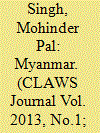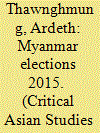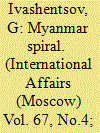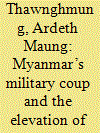| Srl | Item |
| 1 |
ID:
112996


|
|
|
| 2 |
ID:
118499


|
|
|
| 3 |
ID:
143668


|
|
|
|
|
| Summary/Abstract |
On November 8 the vast majority of Myanmar's citizens participated in what official observers – international and domestic – widely hailed as the most genuinely competitive, free, fair, and orderly parliamentary elections in the nation since 1990. Yet the poll, which resulted in a resounding victory for the National League for Democracy (NLD), surprised many observers, who expected that members of the ruling party, the Union Solidarity and Development Party (USDP), would have done better through widely anticipated vote-rigging and manipulation of the results. Right up to a few days before the vote, observers were concerned about the possibility of a cancellation of the election as a result of politically motivated violence or, in the event they went ahead, administrative chaos resulting from errors in voters’ registration information and large-scale vote-rigging and manipulation by the ruling party. These fears were well-founded given that only 3 weeks prior to the elections, the government's Union Election Commission (UEC) proposed delaying the polls, citing recent floods that had devastated 12 out of Myanmar's 14 states and regions, killing 103 people and displacing 1 million others. This proposal predictably met strong resistance from the NLD and other opposition parties, which expected a strong public support for them in the poll.
|
|
|
|
|
|
|
|
|
|
|
|
|
|
|
|
| 4 |
ID:
181355


|
|
|
|
|
| Summary/Abstract |
ACCORDING to the ancient Greek writer and historian Xenophon, the development of history is cyclical. This idea is almost 2,500 years old. Is it applicable to the current situation in the Republic of the Union of Myanmar?
|
|
|
|
|
|
|
|
|
|
|
|
|
|
|
|
| 5 |
ID:
178407


|
|
|
|
|
| Summary/Abstract |
The military overthrow of Myanmar’s elected government in February 2021 has again thrown into upheaval the troublesome relationship between civilian politicians and armed forces that has plagued the country since its first military coup in 1962. t has also brought back into view the relationship between Myanmar’s Bamar majority and the country’s ethnic minorities, a fractious issue that has long been subject to band-aid and patchwork solutions that skirt around the deeper causes of minority disaffection. Myanmar’s minority groups have long-standing grievances against the repression and brutality of the Bamar-dominated military and feel marginalized. Their attitude to the Bamar-dominated National League for Democracy (NLD) government of 2016-2021, led by Aung San Suu Kyi until her ouster and arrest, was one of despair at the continuing death and destruction brought by civil conflict, dismay at the silence of political leaders on the plight of civilians displaced by war, and anger at the quasi-authoritarian policies by the civilian administration. These dynamics have helped determine allegiances in the ongoing protests against military rule, pressed the ousted government into changing its policies to better reflect minority aspirations, and will likely transform Myanmar’s political landscape in a manner that would have been inconceivable before the coup.
|
|
|
|
|
|
|
|
|
|
|
|
|
|
|
|